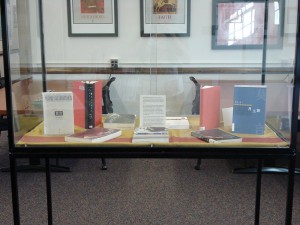
The UNESCO flag. Image courtesy Wikimedia Commons.
This spring the Illinois campus joined a network of more than 3,800 other centers and clubs by gaining our own UNESCO Center for Global Citizenship. This is the 2nd UNESCO-affiliate center in the United States. The center was founded by Amani Ayad, coordinator for the Library and Information Sciences Access Midwest Program (LAMP) at GSLIS; Barbara Ford, director of the Mortenson Center for International Library Programs and member of the U.S. National Commission for UNESCO; and Helaine Silverman, professor in the Department of Anthropology.
UNESCO was founded in 1946 by the United Nations with the goal “to contribute to the building of peace, the eradication of poverty, sustainable development and intercultural dialogue through education, the sciences, culture, communication and information.” They also manage the UNESCO World Heritage List, which identifies global sites of “outstanding universal cultural value.” The UNESCO Center at Illinois seeks to further the goals of UNESCO by hosting expert speakers for community lectures, giving tours and field trips to nearby World Heritage Sites, hosting reading and discussion groups, and many more activities.
The UNESCO Center for Global Citizenship kicked off their work by hosting a visit from Guy Djoken, the Executive Director of the UNESCO Center in Washington, DC this April 14-16th.

First meeting of the UNESCO Center! From left to right: Ellie Hanauer, Associate Director, Center for Global Studies; Prof. Barbara Ford, Director, Mortenson Center for International Librarianship; Don Gerard, Mayor, Champaign; Guy Djoken, Executive Director, UNESCO Center for Peace; Laurel Prussing, Mayor, Urbana; Dr. Helaine Silverman, Director, Collaborative for Cultural Heritage Management and Policy (CHAMP); Amani Ayad, LIS Access Midwest Program (LAMP)
The UNESCO Center will be having its first reading group meeting on May 6th at 7:00pm. All are welcome to come for a discussion of the assigned reading, which is Be Skilled, Be Employed, Be the Change Generation. The event will be held at Strawberry Fields, check it out!
If you’d like to get in touch with the UNESCO Center for Global Citizenship, their email is ucgc.champaign [at] gmail.com.
If you would like to read more about the new UNESCO Center for Global Citizenship, and the work of UNESCO in general, check out these links:




